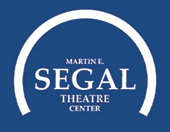Part of the Intimate Relations project, Searching for a New Sun by Robin Rice Lichtig tells the compelling narrative of Rachel-Alma Rosen putting together her family’s tragic past at Auschwitz in order to put together her own identity. She prods her grandmother Ruth, a Holocaust survivor, for details on that one fateful day when some of her relatives were sent to their deaths, but these memories are still too painful for her to reveal. Rachel also appeals to others who lost family members at the same time, and when a few women from very different backgrounds answer her call, they collect their family histories and personal secrets in a cathartic climax.
Reading the play, I was most struck by the verbal and visual poetry that drives Rachel and her grandmother, and I hope that these moments will come across in the excerpts that will be presented at the Martin E. Segal Theatre Center. Rachel, for example, deftly quotes literature on the ways in which family shapes being, while Ruth spins such lines as “The early memory I can turn over in my mind like a butterscotch” and keeps her leaden memories in literal suitcases. Ultimately though, for me, the stories from all of the women become even more powerful with the knowledge that Searching for a New Sun was developed with Jewish-American actresses descended from Holocaust survivors, rendering the play a potential act of healing on and off stage that draws from personal experiences. At the discussion after the presentation, I’m interested in hearing more about how this play was created and how it has affects its collaborators.
This entry was posted in Uncategorized. Bookmark the
permalink. Both comments and trackbacks are currently closed.








Robin Rice Lichtig’s Searching for a New Sun
Part of the Intimate Relations project, Searching for a New Sun by Robin Rice Lichtig tells the compelling narrative of Rachel-Alma Rosen putting together her family’s tragic past at Auschwitz in order to put together her own identity. She prods her grandmother Ruth, a Holocaust survivor, for details on that one fateful day when some of her relatives were sent to their deaths, but these memories are still too painful for her to reveal. Rachel also appeals to others who lost family members at the same time, and when a few women from very different backgrounds answer her call, they collect their family histories and personal secrets in a cathartic climax.
Reading the play, I was most struck by the verbal and visual poetry that drives Rachel and her grandmother, and I hope that these moments will come across in the excerpts that will be presented at the Martin E. Segal Theatre Center. Rachel, for example, deftly quotes literature on the ways in which family shapes being, while Ruth spins such lines as “The early memory I can turn over in my mind like a butterscotch” and keeps her leaden memories in literal suitcases. Ultimately though, for me, the stories from all of the women become even more powerful with the knowledge that Searching for a New Sun was developed with Jewish-American actresses descended from Holocaust survivors, rendering the play a potential act of healing on and off stage that draws from personal experiences. At the discussion after the presentation, I’m interested in hearing more about how this play was created and how it has affects its collaborators.